In the last round of the English Premier League Brighton welcomed Manchester City for the match that was decisive in the battle for the trophy. The away team needed a win to secure their spot at the top of the table and to go back to back in winning the prestigious title.
Pep Guardiola’s team fully dominated the game and showed how far they got during the Spaniard’s time at the club marking their second Premier League win in his three years at the wheel. The Seagulls tried to spoil the celebration for the Citizens, but they weren’t at the level their opponents were.
This tactical analysis will show you how Man City got the win that meant championship for them, and how they did it in the way they used to do it throughout the whole season.
Lineups
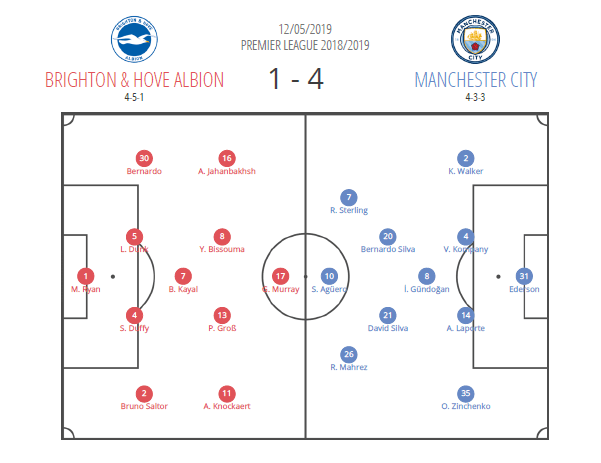
Brighton started the game with their usual 4-5-1 formation with their strongest side, even though this match didn’t have importance for them in terms of the result. They focused themselves on counter-attacking, relying on Anthony Knockaert and Alireza Jahanbakhsh as their main forces down the flanks, and Glenn Murray on top of the squad.
Guardiola set his team in his favourite 4-3-3 formation but with a lot of transformations during the game. They went into the match with just two truly central midfielders that were David Silva and Ilkay Gundogan, and three more offensive players in Bernardo Silva, Raheem Sterling and Riyad Mahrez who were constantly rotating and providing support to the lonely striker Sergio Aguero.
Manchester City’s surprising formation
The away team got into the match with the clear approach of winning at all costs, so they tried to play their game with as much attacking arsenal they could infiltrate in their starting 11. Spanish coach sought to surprise his opponent with interesting set-up with Sterling as an inside forward, Mahrez next to the left sideline, and Bernardo wide on the right.
Their plan was to have the Englishman near the action at all times and to get him in more concrete opportunities out from the central and inner corridors. He tended to break into spaces that were left free due to Aguero’s movements and dragging of defenders.
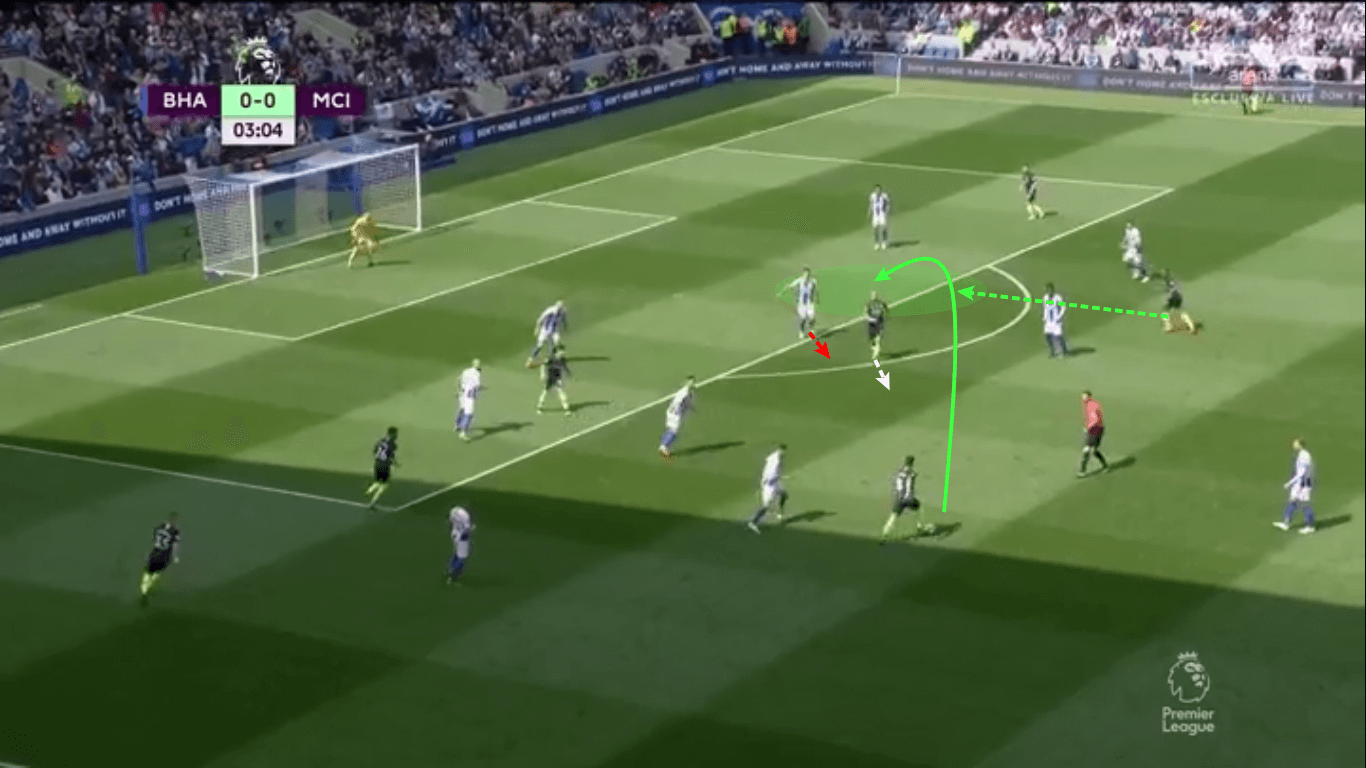
As we can see on the picture above, City’s number seven tries to exploit empty room behind central defenders’ back. That was the plan for the visitors in the opening phase of the game since they strived to get to their chances by cutting inside and drilling through the middle.
Sterling’s positioning brought to them also a great chance to attack down the flanks because defenders’ attention was mainly directed at him. That left their wingers free most of the time, so they got a lot of balls in their feet and managed to provide crosses or similar inside-balls.
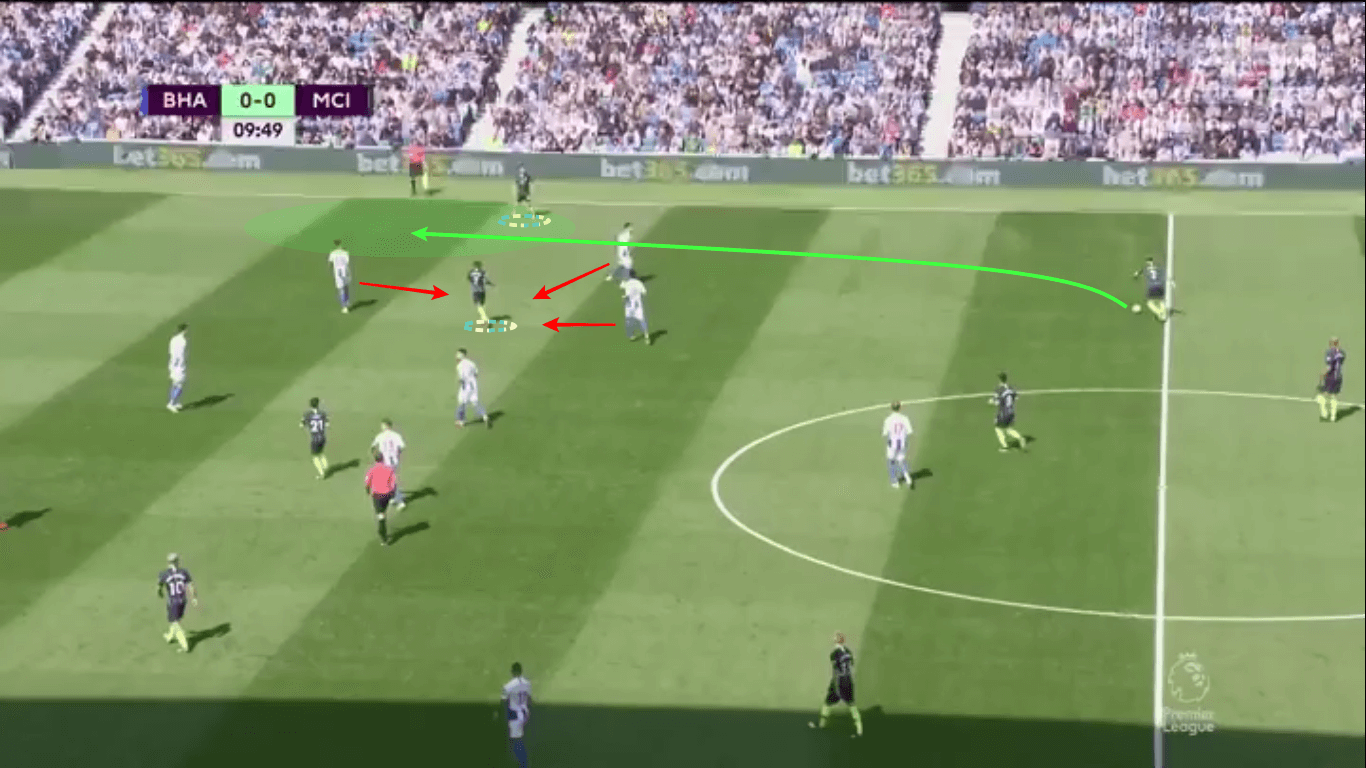
Gundogan served his attackers with a lot of good balls but Brighton was defending in a very dense low block which was tough to break. Front four players of the Manchester team must’ve communicated and cooperated in a high-quality manner so they could get into their necessary chances to score.
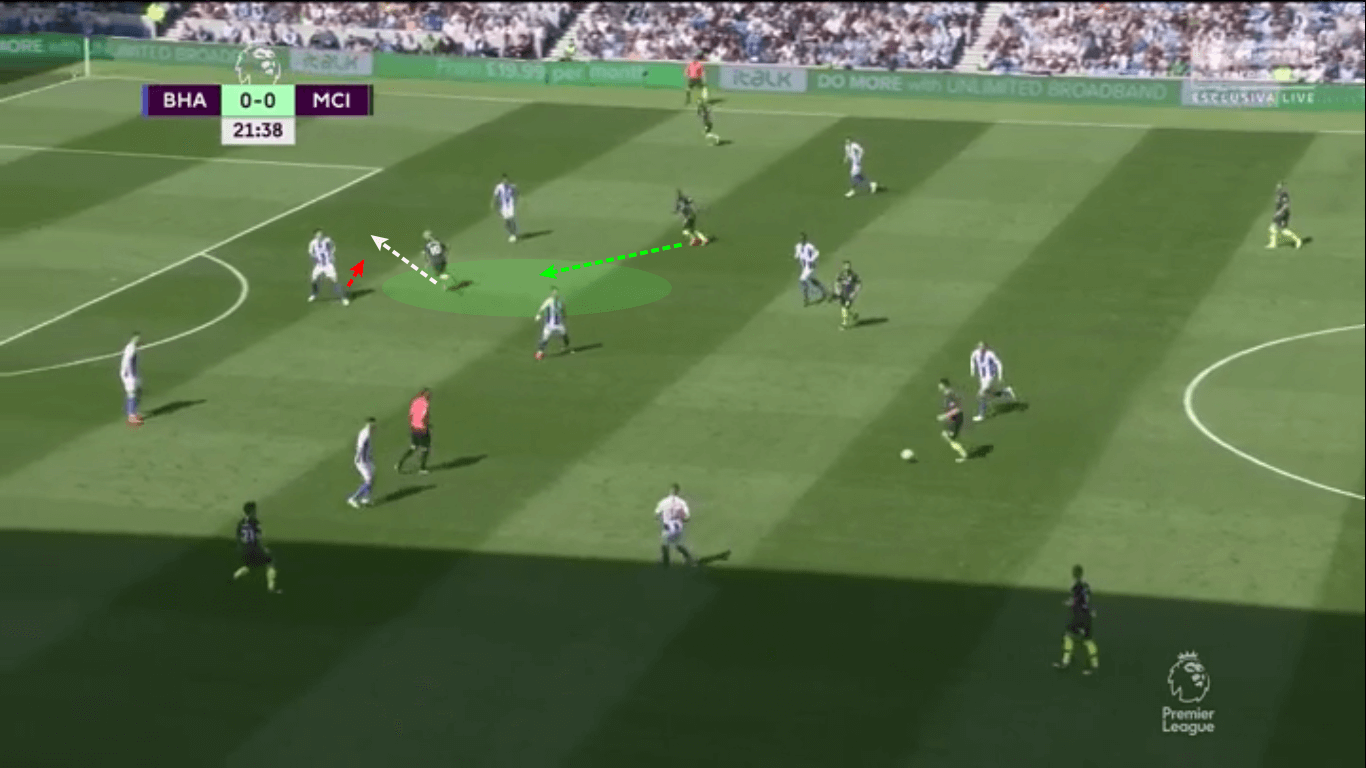
Even in situations when they didn’t get the ball, Aguero and Sterling cooperated pretty well in order to create a room from one or the other. Fake motions of both of the attackers confused the home team’s defensive line in a few situations, and although they didn’t score from them they got to threaten Ryan’s goal.
After Chris Hughton’s team got the lead and left the opposition behind in unenviable situation, Guardiola changed his approach and set his team in the more expected lineup with Bernardo in the middle and English-Algerian duo on the wings, making Mahrez change himself to the right, while Sterling on the left.
Guardiola’s all-in offence
Manchester City was going in hard right from the first minute, but an unexpected goal in their net made them furious and they started to play even more hazardous. They were back in their most usual shape of play and they had against themselves even more closed side than it was before the 0-1, still, they found the way to get back in the game and to alter the result in their favour.
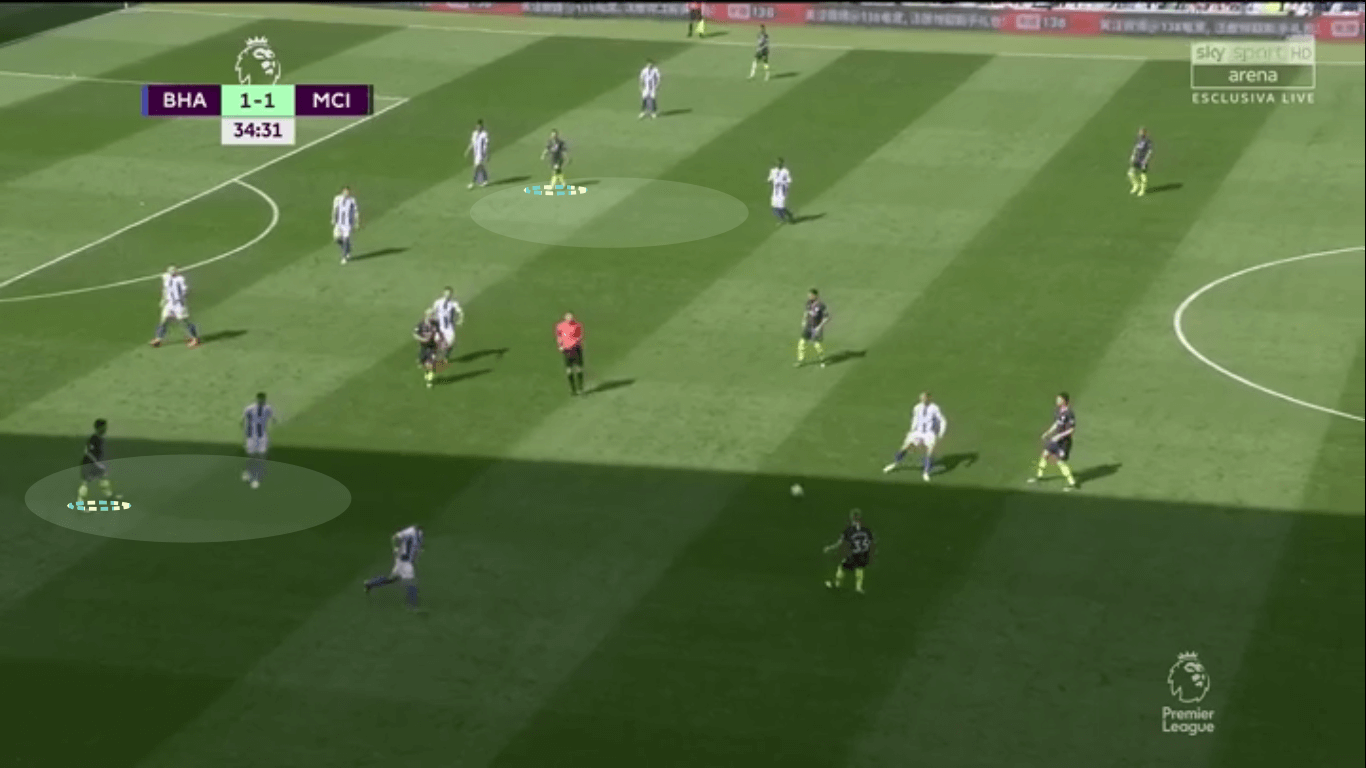
Both of the attacking central midfielders tended to position closer to the opposition’s goal and to get the ball at the edge of the box. That approach pushed Brighton even lower on the pitch than they tended to sit and got the play to take place mostly very close to their goal.
This type of attacking setup for the visitors made it difficult for the Seagulls to defend, mostly in terms of swapping the players between them when they leave their zones of guarding. High positioned midfielders forced Hughton’s defensive line into mistakes as there was always a rotation in the Man City’s final third as much as it was a constant surplus of the away team’s players.
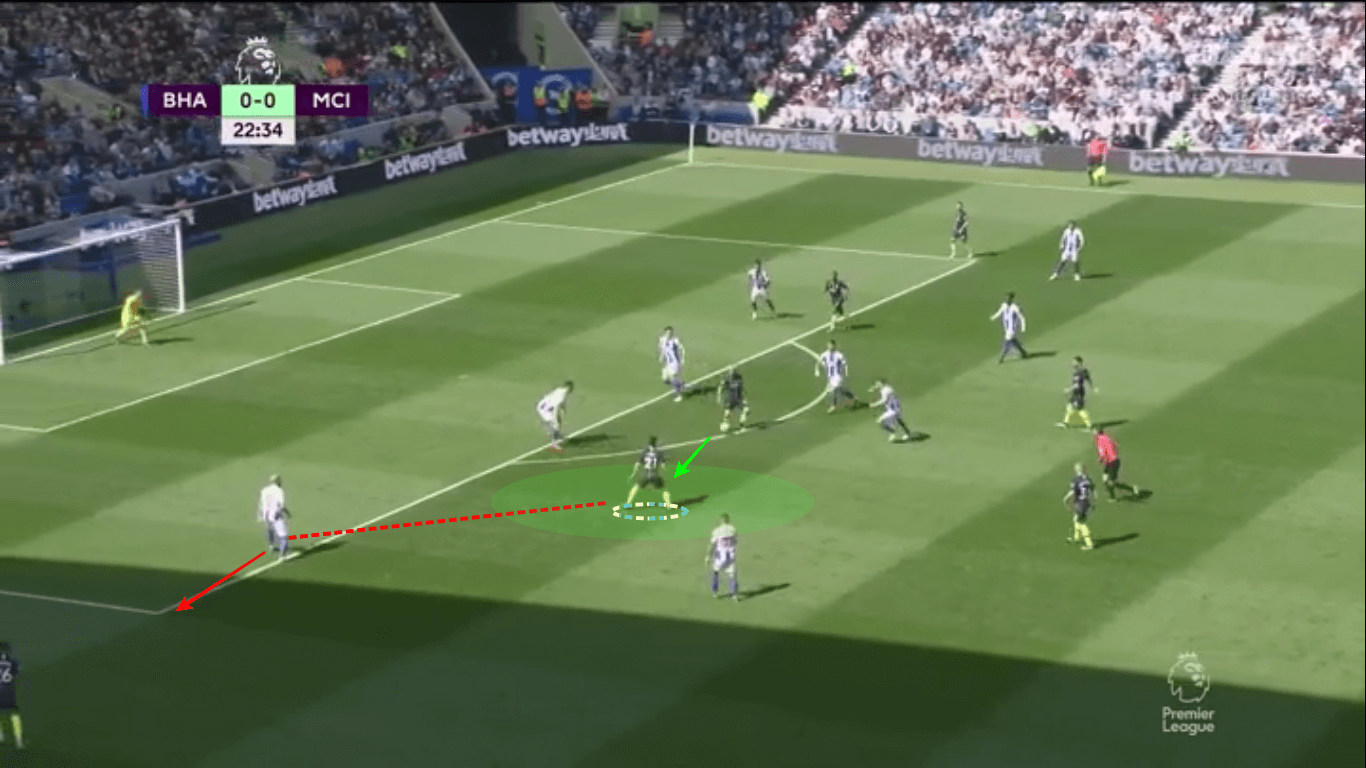
The home team’s full-backs had a lot of issues with how to guard both a high-positioned central midfielder and wide winger so often one of them was left free and got the ball in the dangerous zone. If defenders guarded one closely, the other would break free and get the ball – at the edge of the box or next to the sideline.
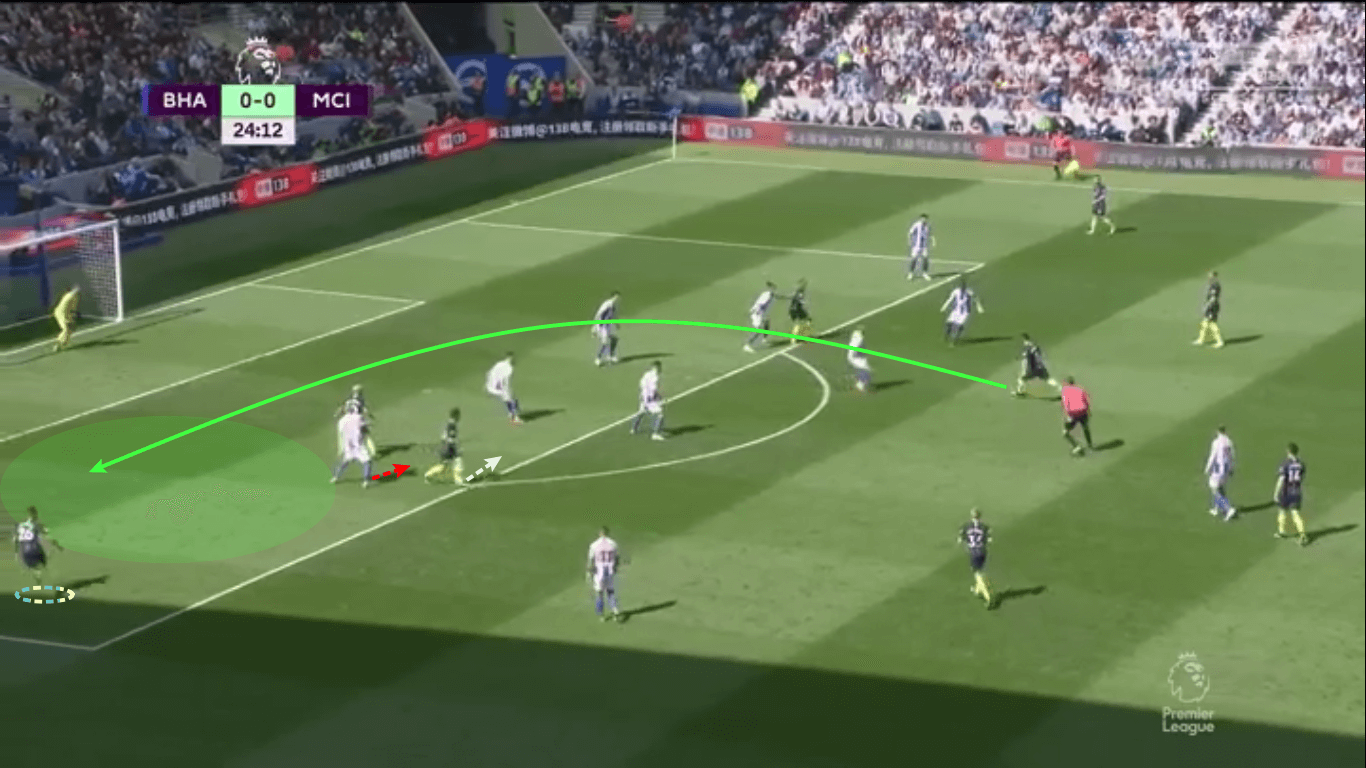
City continued with their rotations through the whole game as they brought results and were very successful in confusing defenders. Wingers and midfielders kept positioning high, helping Aguero lock the defenders in the central zones of the pitch so the players on the flanks could have free paths to get passes from the middle.
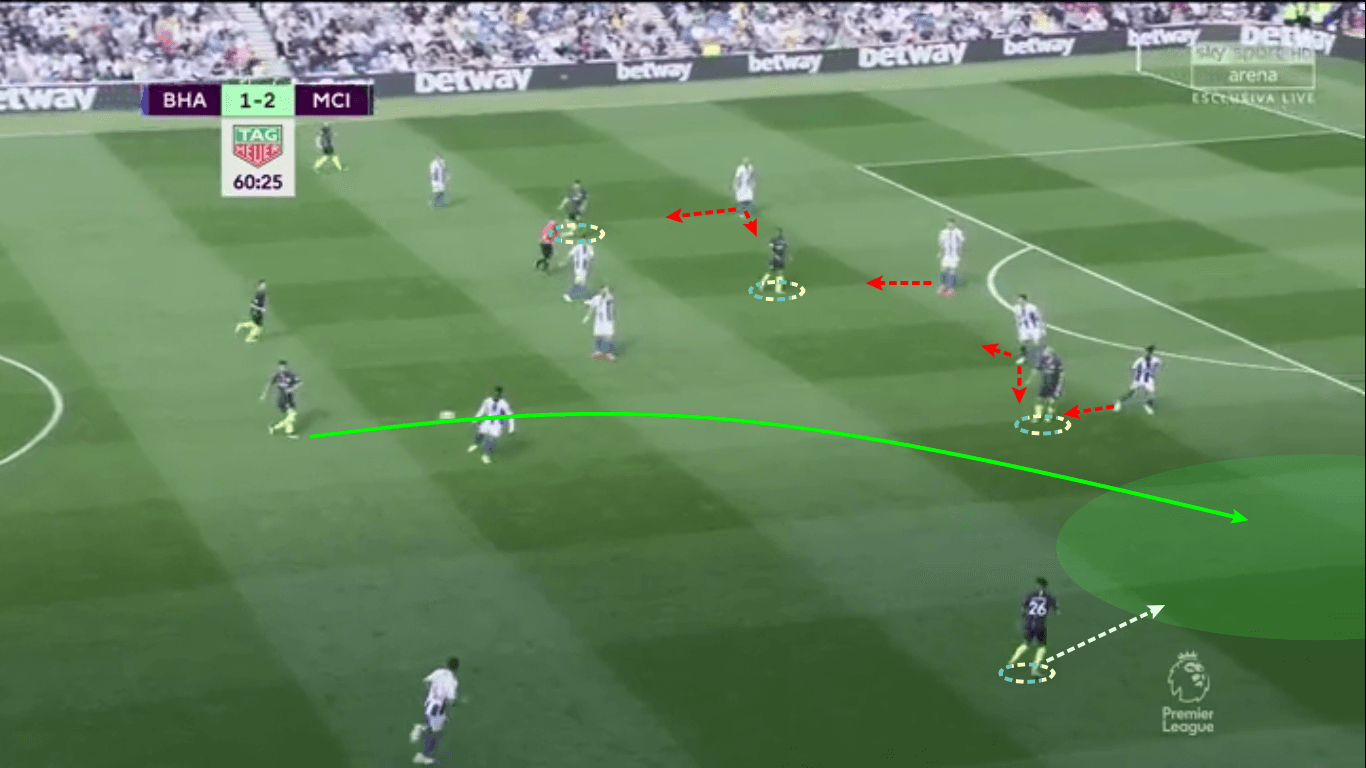
Sterling and Mahrez exploited those situations due to their pace and individual advantages against their direct guards who were Bruno Saltor on one side, and Bernardo on the other.
The Argentinean striker played a huge role for his team with his movement and passing game as much as with goal that got them even in the first place. He often lowered himself on the pitch so he could drag defender with him, which created a free room behind their back for midfielders or wingers to run in.
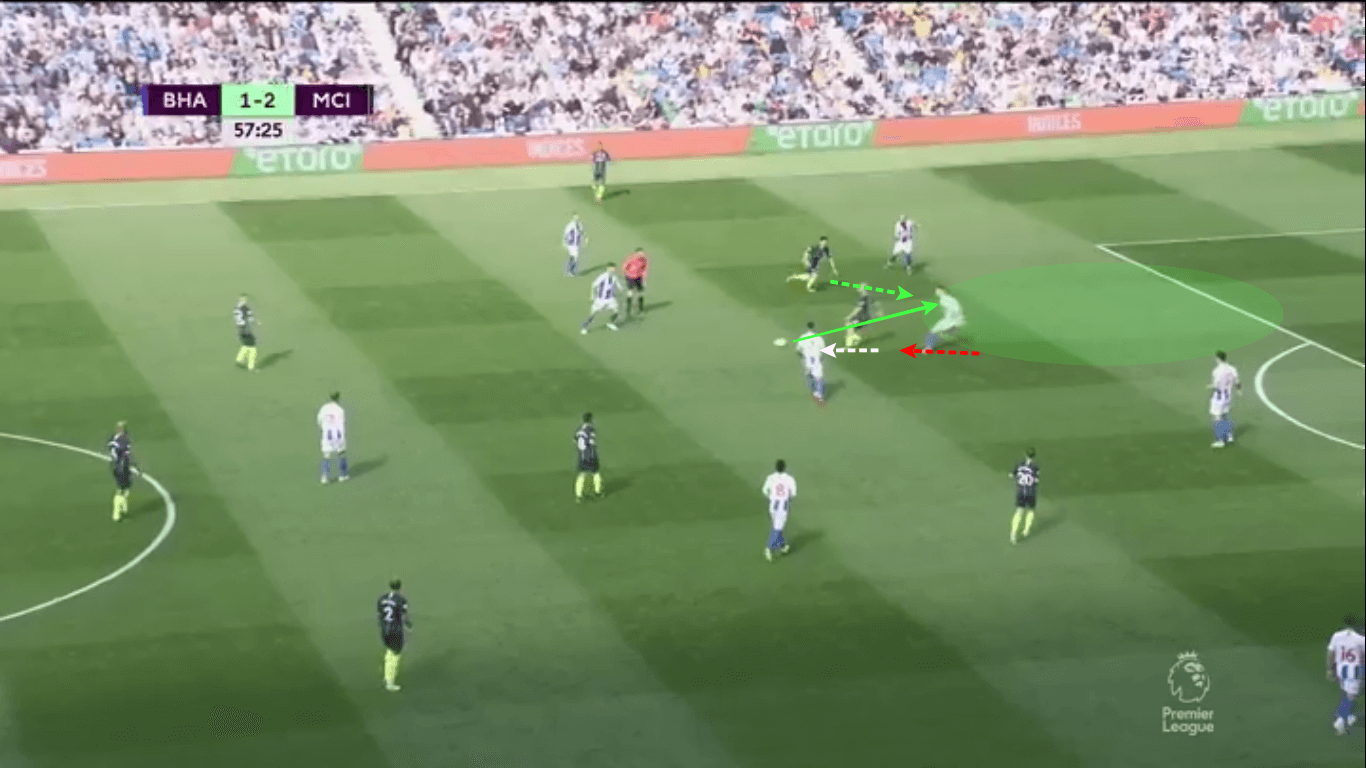
Guardiola’s boys’ positioning and motion forced Brighton’s players into mistakes. They struggled to provide defensive support to each other and didn’t know how to guard opponents who were out of their main position.
Overloading for the opportunities
The visitors knew they were a far better side when it comes to possession play so their plan was to keep the ball as long as possible creating their actions on the densely populated parts of the pitch.
Manchester City tried to overload in one zone of the field in order to pull the defenders into their trap and to skip the play to the other side where there were one or two of their players who were isolated to play “one on one” or “two on two”.
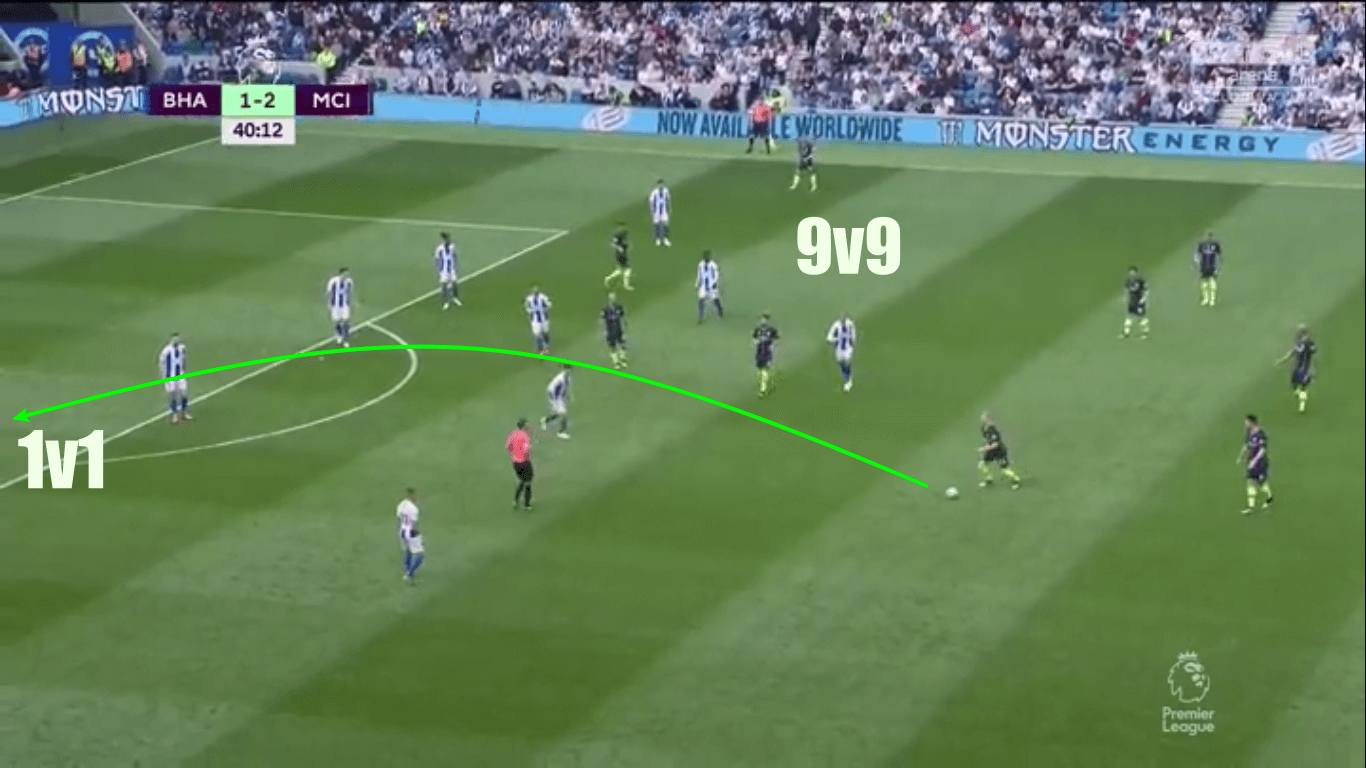
In the picture, we see that Guardiola’s team created the great density of players at the right-handed side in order to make a good situation for Sterling who was the only player left next to the left sideline.
These overloads managed to pull defenders out of their positions since they thought they could get to the ball more easily because of the crowdedness of the players in one place, but the away team brilliantly both made and solved those situations.
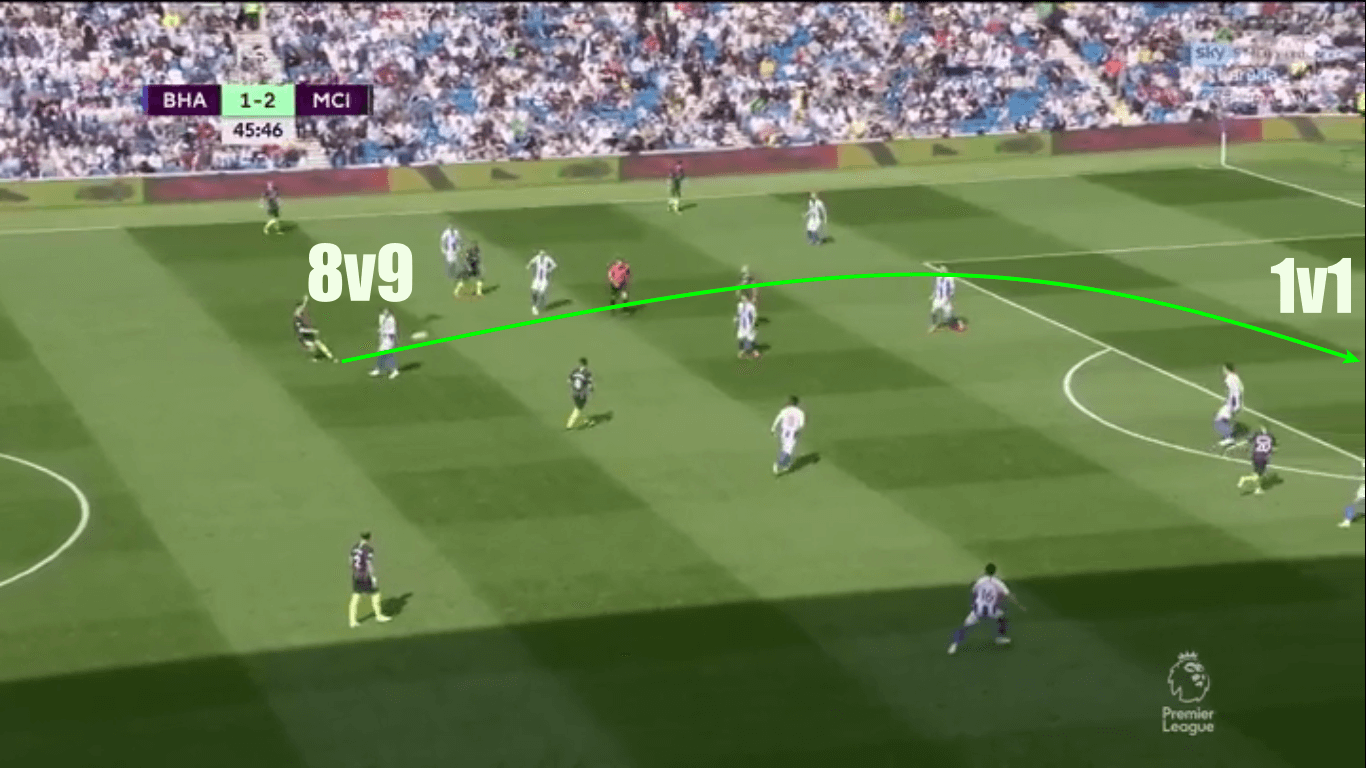
City’s isolated players had a lot of the advantages when the ball was passed to them from the other side since they were quicker than their guards and technically better. They tended to get low crosses from those situations or to try to pass return-balls for their team-mates at the edge of the box which created many good goal-scoring opportunities for the team that won the game and the championship ring.
Conclusion
Manchester City fully deserved a win in this match and they were merited to get their hands on the Premier League trophy for this season. Guardiola’s boys have shown in this match all of their best patterns of play and why they are the best team in England.
Brighton didn’t have enough quality to mess up their plans and they were the last team on the Citizens path to glory. The Spanish coach mastered the Premiership and his team is on a good way to become even better and more frightening side next season in which they will probably go a few steps further in the Champions League and will surely be a contender to defend their domestic title.
If you love tactical analysis, then you’ll love the digital magazines from totalfootballanalysis.com – a guaranteed 100+ pages of pure tactical analysis covering topics from the Premier League, Serie A, La Liga, Bundesliga and many, many more. Buy your copy of the May issue for just ₤4.99 here, or even better sign up for a ₤50 annual membership (12 monthly issues plus the annual review) right here.

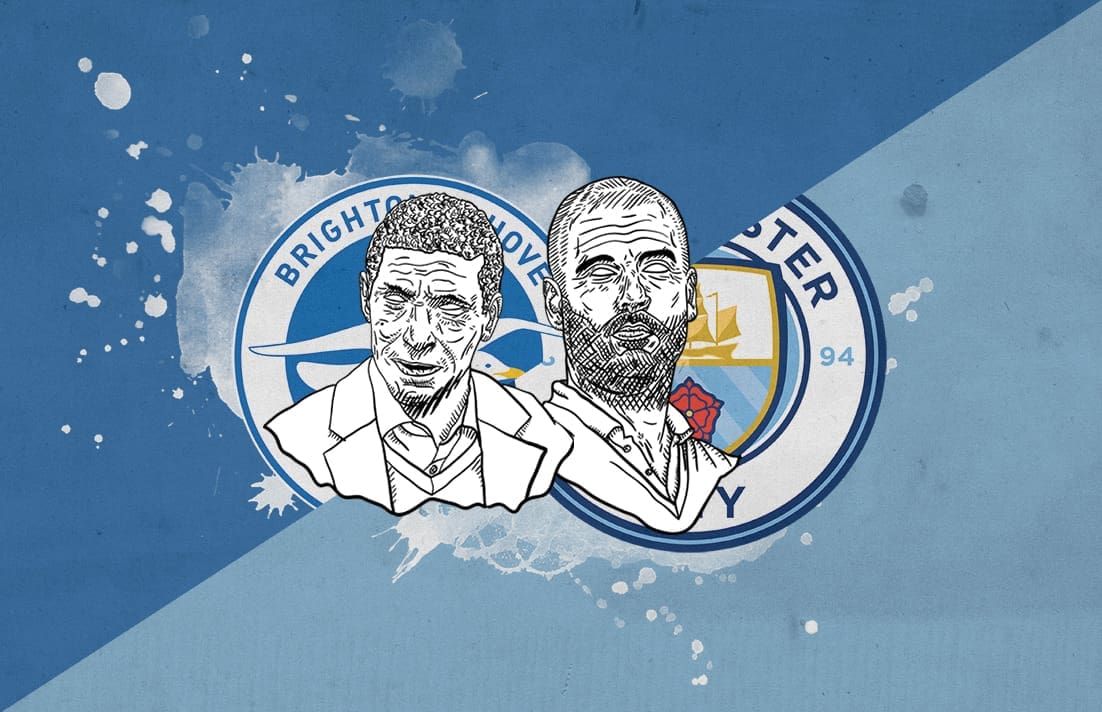



Comments